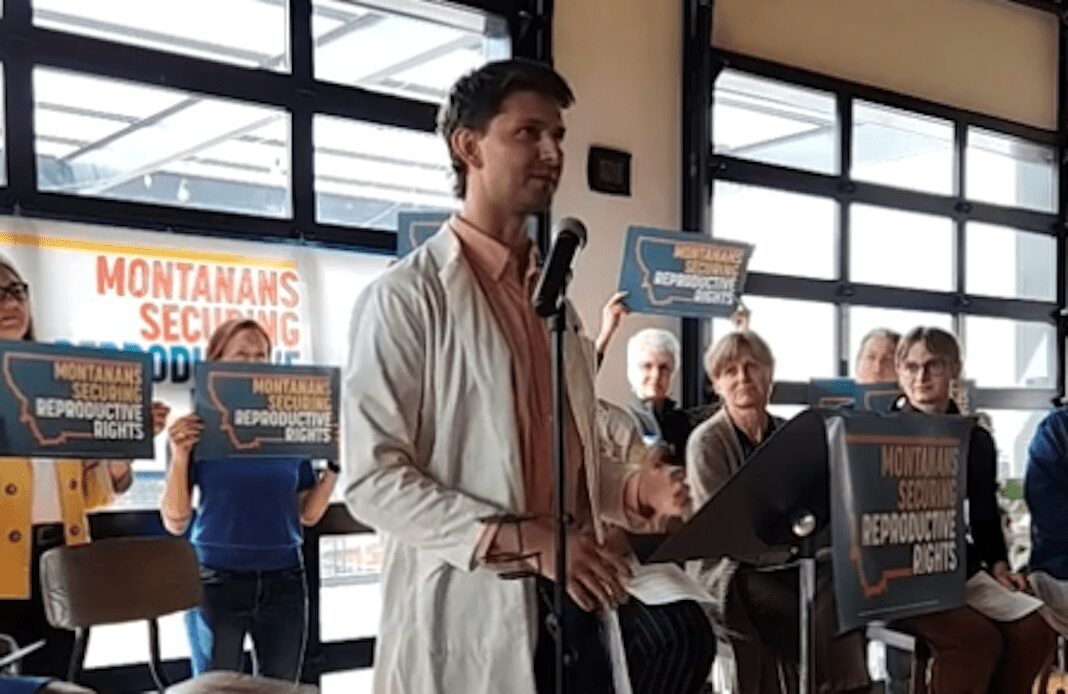Republicans back Gianforte’s veto of bill to use marijuana tax for state needs
‘Next time you drive over a washboarded road to your favorite fishing spot, thank Greg Gianforte,’ said Ryan Busse, his opponent in the governor’s race.

The overwhelming bipartisan support of a bill to take the money raised from Montana’s new marijuana tax and allocate it toward wildlife habitat, addiction treatment and county roads and bridges has apparently been transformed to overwhelming partisan support for the Republican governor, who is running for reelection. A year ago, the Legislature, which is two-thirds Republican, passed that bill with 130 of 150 legislators voting for it. But in results revealed on Friday, only 41 of those 130 one-time supporters voted to override Gov. Greg Gianforte’s veto of the bill, none of them Republicans.
The path to last week’s reversal was twisted, beginning with Gianforte’s tactics in the original veto, which came in the early morning hours of May 2, 2023, the day the Legislature was preparing to adjourn. Lawmakers adjourned hours later, apparently unaware of the veto. That sent the bill to a state of limbo, which seemed to be the governor’s intention. Montana law has a provision for a mail-in poll of legislators for vetoes that occur after the Legislature adjourns, but his early-morning action allowed Gianforte to argue that the veto, which technically came while the lawmakers were still in session, was not subject to that provision, so no override vote could occur.
Backers of the bill, a large, diverse coalition of both conservation groups — a constituency that leans Democratic — and the state’s county commissioners — mostly Republican — challenged the governor’s argument with a lawsuit, and the 1st Judicial District Court in Helena in March agreed with those plaintiffs. The court ordered the mail-in poll.
That ruling also triggered a boisterous reaction from Republican Senate President Jason Ellsworth, who invoked an allegation that has become a Republican talking point. Ellsworth charged that the problem in this case was judicial overreach, not the governor’s tactics in attempting to dodge the override vote. Ellsworth issued a letter signed by him and 27 of his Republican colleagues urging legislators not only to vote against the override, but to boycott the mail-in poll altogether, on the grounds it was unconstitutional.
That plea proved to be a measure of party discipline. Sixty-nine legislators, all Republicans, did as Ellsworth asked and did not vote on the issue.
Gianforte picked up the judicial talking point in reacting to the vote. In a statement issued on Friday, he said: “I applaud the Montana Legislature for today rejecting radical judicial overreach, as the court sought to meddle in the legislative process. Legislators also made clear that we should continue using marijuana revenue to fund addiction and recovery services, law enforcement, veterans, wildlife habitat, and state parks and trails, just as Montanans intended when they voted for recreational marijuana at the ballot box in 2020.”
The second part of that statement marks the interesting point of disagreement in this matter. Gianforte’s target with his veto was not the conservationists, but local government. He issued a veto message that did not mention the green groups supporting the measure, groups that consistently oppose the governor electorally and otherwise. His veto message did, however, throw a punch at the Republican-dominated counties, alleging they would spend the money on “capricious and unnecessary projects.” The bill earmarked 20% of the tax’s revenues to county road improvements.
That statement has provoked considerable anger in county courthouses around the state, which are mostly rural and constitute the heart of Gianforte’s constituency. He was able to discipline Republican legislators to fall into line, but the open question is how county-level anger will resonate in November’s election.
Gianforte’s opponent in the governor’s race, Democrat Ryan Busse, was quick to seize on the issue on Friday, issuing the following statement: “Next time you drive over a washboarded road to your favorite fishing spot, thank Greg Gianforte. If you’re a veteran wondering why state services are failing, thank Greg Gianforte. Killing a popular idea supported by a majority of Montanans—and their Republican elected leaders—is dangerous, dumb and deliberately harmful to the people of our state.”
The tax on recreational marijuana is expected to generate more than $70 million a year. With the failure of the override, that money remains unallocated, collected but in limbo. It sits with the state’s current budget surplus of about $1 billion, about a quarter of the total budget, collected in taxes but unspent on services.



